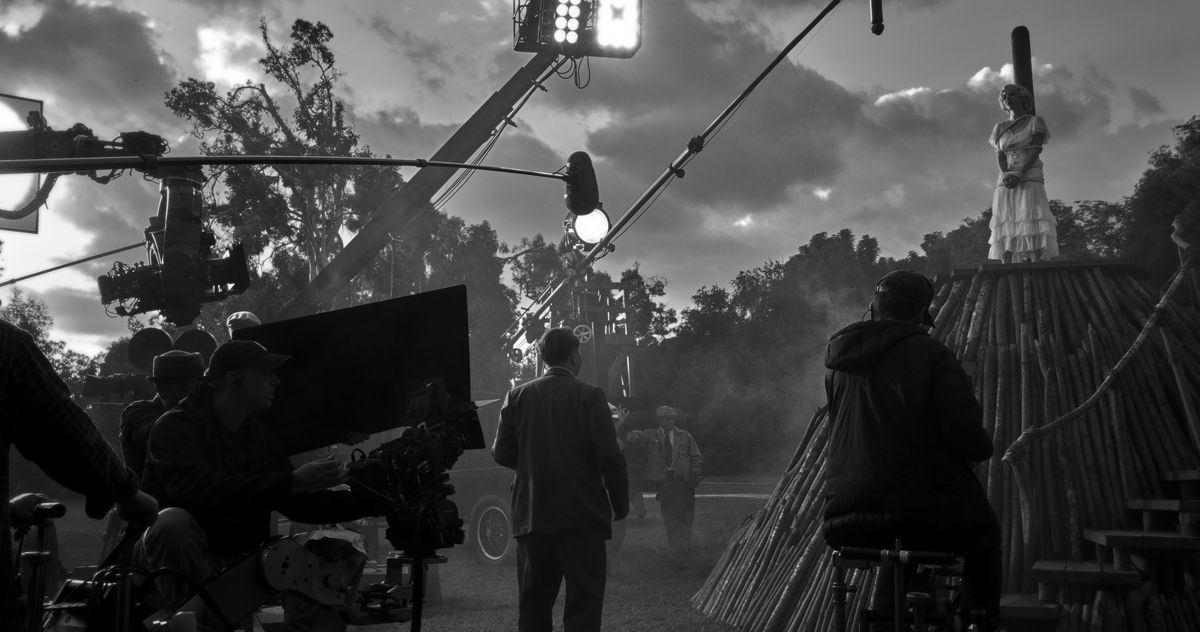A landmark year in terms of diversity, this year’s Oscars features the most exciting Best Picture category in recent memory. With such a strong set of films up for the night’s top prize, predicting a winner is a daunting task. We asked our writers to do just that. Here is the case for every Best Picture nominee at this year’s Academy Awards.
Nomadland

Fascinating, emotive storytelling. An unhurried character study. Breathtaking bleakness. Nomadland deserves Best Picture—not because the soundtrack is stunning, or because it employs a diverse cast and crew—but because Zhao’s film gives voice to the voiceless. Nomandland‘s subject is the victims of endless unfulfilled promises—promises from others, from the American Dream, from life itself. Following Fern’s (Frances McDormand) exploration of both America and herself, the film is a love letter to a community of almost-broken individuals. It is a poignant picture of those abandoned by civilisation—and also those who abandoned it. Zhao shows us that silence can be emotion’s most powerful accompaniment, yet also uses music and dialogue to harness audience anger. One Nomad compares themselves to the pioneers, but this life is not progress, it is a regression. A failure of society to protect and provide. This quiet, unspoken anger is Zhao at her best, and it merits every Oscar.
Words by Georgia Douglas
Read our review of Nomadland here
Mank

Leading the pack with a total of 10 nominations, this year’s heavyweight contender for Best Picture is Mank. Following Herman Mankiewicz as he writes the screenplay for Citizen Kane, David Fincher’s film gives the supposed ‘greatest film ever made’ the Hollywood treatment. Netflix was smart to allow Fincher to tell this story in the style of Citizen Kane, emulating a film of the 40s down to the inclusion of ‘cigarette burns’. While the film’s themes are muddled (being just as much a celebration of Hollywood as an indictment of America’s ‘dream factory’), its style may be the most compelling reason for Mank taking home the big prize. In a crisis year which threatened to kill off theatrical distribution, Mank’s celebration of cinema might just strike a chord with the Academy. However, its status as the most nominated picture at this year’s Oscars does not guarantee success. Indeed, Citizen Kane was nominated for nine Oscars and only took home one for Best Screenplay. Welles’ response on that night may just be relevant again this year: “Well, that, my good man, is Hollywood.”
Words by Jake Abatan
Read our review of Mank here
Judas And The Black Messiah

In terms of which Best Picture nomination is the most pertinent, I fail to see a case for anything other than Judas and the Black Messiah. Focusing on the infiltration of the Illinois chapter of the Black Panther Party, chaired by Fred Hampton (Daniel Kaluuya) at the hands of FBI informant William O’Neal (Lakieth Stanfield), Shaka King’s film boasts two powerhouse performances that drive its crucially relevant themes. King crafts an uncompromising, riveting depiction of history, which simultaneously presents itself as contemporary commentary. Given the importance of the Black Lives Matter movement and the calls for much-needed change in the world that have been seen over the past year, it’s hard not to see the significance of Judas and the Black Messiah and how it is completely deserving of the coveted Best Picture title.
Words by Eddie Nourse
Read our review of Judas And The Black Messiah here
Promising Young Woman

Writer-director Emerald Fennel’s electric feature debut Promising Young Woman is a damning indictment of rape culture. Medical school drop-out Cassie (Carey Mulligan) spends her days waiting tables, and her nights in clubs pretending to be devastatingly drunk until the inevitable ‘nice guy’ offers to take her home. Fennel’s genre-spanning work features a sharp, punishing script that lets no one off the hook, and is one of the most accurate portrayals of rape culture there has ever been put to screen. In a society where misogyny is so normalised that it only this year became recognised as a hate crime, and in the current political landscape of Sarah Everard and #ReclaimTheStreets, Promising Young Woman deserves to win Best Picture because every woman who has been harassed or assaulted deserves to be told that the world is listening.
Words by Jackie du Bled
Read our review of Promising Young Woman here
Minari

A concept endlessly explored in film, Lee Isaac Chung’s Minari presents the complexities of the American Dream with ease. Restraint is demonstrated from the first scene. From hesitancy and disappointment to wonder and excitement, every immigrant will recognize that first arrival to a new home. This measured approach is observed in the stunning cinematography which, with warm light and soft colours, complements the gentle storytelling. The performances speak for themselves. Han Ye-ri in particular is incredibly effective at communicating the intricacies of her character through incredibly measured acting. The relationship between David and his grandma is an unusually earnest depiction of love across cultures. It does not flinch in the face of conflict, nor does it rely on stereotypes. In fact, while many of the depictions will be familiar to children of immigrants, each character is three-dimensional, never generalized for the sake of universal appeal.
Words by Elisabetta Pulcini
Sound Of Metal

Riz Ahmed has had a stellar year. His performance in Mogul Mowgli stole the show at the London Film Festival, and now Ahmed has earned a himself a nomination for Best Actor for his role in Sound of Metal. Ahmed plays Ruben, a touring musician in the metal band, Backgammon. Ruben and girlfriend Lou (Olivia Cooke) travel the states in their shared RV until one day Ruben wakes up with severe hearing loss. Sound of Metal doesn’t make a saint of its protagonist, but stunningly delves into the mind of a man who lost himself long before his hearing. It’s often depressingly candid, but presents itself as a beacon of hope for the Deaf community. Their difference isn’t something to be changed, but to be accepted and embraced. Despite the brilliant lead, competing against the likes of Gary Oldman and the late Chadwick Boseman makes it far more likely we’ll see this win Best Picture than Best Actor—and rightly so.
Words by Libby Briggs
Read our review of Sound Of Metal here
The Trial Of The Chicago 7

Aaron Sorkin’s The Trial of Chicago 7 is a strong contender at this year’s Oscars on the grounds of its superb ensemble, naturalism and clever parallels to the current political climate of protest and policing. The cast embody the phrase ‘act for the other’, making the ensemble court scenes absolutely electric to watch. Aiding in the creation of the ensemble’s dynamism is Sorkin’s script, filled with his infamous one-liners and passionate monologues—neither of which come across as pretentious. The film finds contemporary resonance, too, in two recent protest movements: the US parallel of the handling of the #BLM protests last summer and the UK parallel of the passing of the ‘Police, Crimes, Sentencing and Court’ Bill, which only make the film’s themes seem more urgent. For all of these reasons, The Trial of the Chicago 7 would be a worthy winner at this year’s Oscars.
Words by Freyja Elwood
Read our review of Trial Of The Chicago 7 here
The Father

This year has so many amazing nominees for Best Picture, but The Father stands out as the best. A very accurate portrayal of dementia, The Father manages to break your heart into a million pieces on more than one occasion. Anthony Hopkins gives one of his best performances here and manages to channel anger, vulnerability, honesty and confusion into a captivating portrayal of a man losing his mind to an awful disease. Alongside him, Olivia Colman gives another Oscar-worthy performance as his daughter, which is just as heartbreaking to watch. The Father deserves to win Best Picture because it handles the sensitive topic of dementia in such a delicate way, managing to keep the viewer trapped in the emotional toil that arises from losing a family member day after day.
Words by Brett Herlingshaw
Support The Indiependent
We’re trying to raise £200 a month to help cover our operational costs. This includes our ‘Writer of the Month’ awards, where we recognise the amazing work produced by our contributor team. If you’ve enjoyed reading our site, we’d really appreciate it if you could donate to The Indiependent. Whether you can give £1 or £10, you’d be making a huge difference to our small team.
